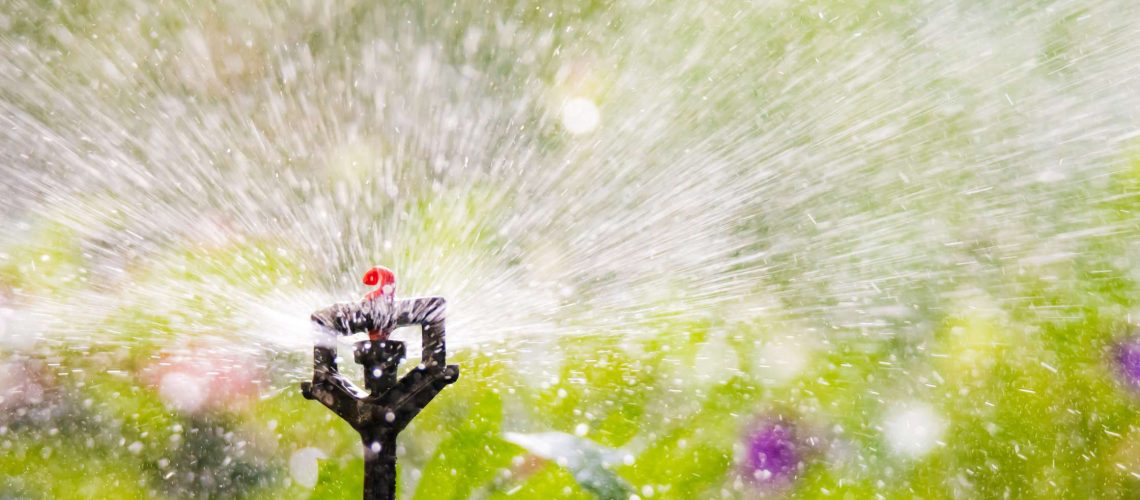Even with regular watering, brown spots may emerge in your landscape, indicating that your commercial irrigation system is not operating correctly. A sudden increase in your water bill could indicate leaks, while misting from sprinkler heads may suggest pressure issues.
If you’re not monitoring timer settings and run times, you could be wasting water and money. Understanding these signs is crucial, but are you aware of the other hidden problems that could be lurking in your system?
1. High Water Bill Indicators
If you’ve noticed a sudden increase in your water bill, it might be time to investigate potential leaks in your irrigation system.
Start with leak detection; check for visible cracks or wet spots in your landscape. This not only helps with water conservation but also boosts system efficiency.
Conduct a cost analysis of your water usage—if it’s significantly higher, leaks may be the culprit.
Establish a maintenance routine to inspect and repair your irrigation system regularly; this can prevent minor issues from escalating into costly repairs.
2. Identifying Brown Spots
Brown spots on your lawn often signal irrigation problems that need immediate attention. These discolorations may indicate lawn diseases or insufficient soil moisture, both of which can harm plant health.
Start by conducting coverage testing of your sprinkler system to pinpoint areas that aren’t receiving adequate water. You might find that some sprinkler heads are blocked or misaligned, requiring irrigation adjustments to enhance water distribution. Cleaning or replacing these heads can significantly improve coverage.
Regularly monitoring your lawn will help you catch issues early, ensuring your grass stays lush and healthy. By addressing brown spots promptly, you’ll maintain the overall beauty and vitality of your landscape.
3. Water Misplacement Issues
Water misplacement in your irrigation system can lead to wasted resources and uneven lawn growth. To tackle this, start by making necessary sprinkler adjustments to ensure water reaches only the intended areas.
Check your irrigation design—if sidewalks are getting wet, they may need redesigning. Implement drainage solutions to prevent water pooling in unwanted spots, which can harm your landscape efficiency.
Additionally, focus on pressure regulation; improper pressure can cause misting or uneven distribution. Regular inspections will help identify issues early, ensuring your sprinkler system functions optimally.
4. Timer and Run Time Problems
Ensuring your irrigation system’s timer functions properly is crucial for maintaining an efficient watering schedule. If you notice irregular watering patterns, it might stem from incorrect timer settings or programming errors.
Check your timer’s display for any signs of malfunction or a blank screen, which could indicate power source issues. Adjusting the run time is also essential; too short or long watering can affect irrigation efficiency.
Additionally, automation issues may arise from outdated timers or faulty wiring. Regularly reviewing and resetting your timer settings can help prevent these problems.
If you’re unsure about your system’s performance, consider consulting a professional for a thorough assessment and recommendations to optimize your irrigation system.
5. Misting From Sprinkler Heads
If you notice your sprinkler heads producing mist instead of a steady spray, it may indicate an issue with water pressure that needs addressing. High water pressure can cause misting, which leads to poor irrigation efficiency and wasted water.
You should start with some simple sprinkler adjustments to see if that resolves the issue. If not, consider installing pressure regulators for consistent spray. These misting solutions not only enhance coverage but also help conserve water.
Regular maintenance tips include checking for blockages and cleaning sprinkler heads to ensure optimal performance. These steps will maintain proper pressure regulation and improve your landscape’s overall health and appearance.
6. Irrigation During Rain Events
Irrigating your landscape during rainy events isn’t only wasteful but can also lead to over-saturation and potential damage to your plants.
To prevent this, consider installing rain sensors as a key component of your irrigation system. These sensors automatically shut off watering when it rains, saving water and ensuring your landscape remains healthy.
Regular irrigation system maintenance is essential to keeping sensors functional. Implementing water conservation strategies, like seasonal irrigation adjustments, can further optimize your system’s efficiency.
Partner with R & R Sprinkler for Optimal Irrigation Solutions
Maintaining an efficient commercial landscape irrigation system is essential for maximizing both resource efficiency and cost-effectiveness.
R & R Sprinkler, with its expertise in landscape and irrigation services, is dedicated to helping clients achieve water conservation and cost savings.
Their team is skilled in identifying issues such as brown spots, high water bills, and malfunctioning sprinkler heads, ensuring that your irrigation system operates at peak performance.
By partnering with R & R Sprinkler, you can proactively address any irrigation concerns, conserve water, and ultimately save money while enhancing the beauty of your landscape.


